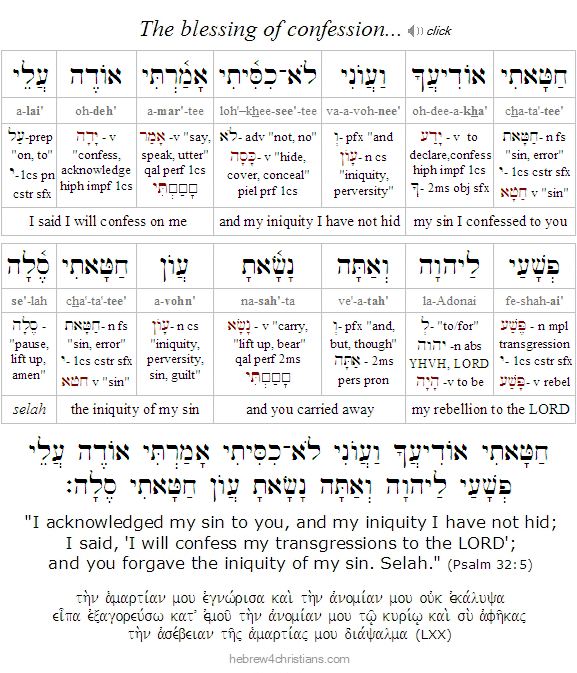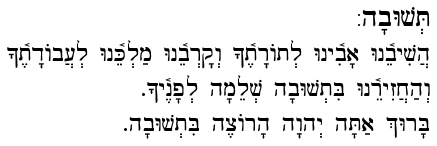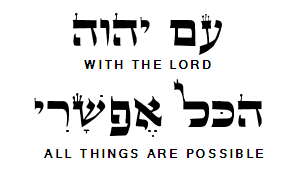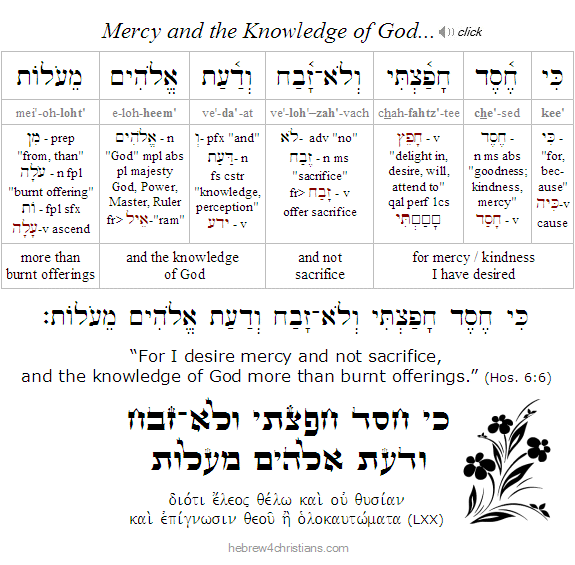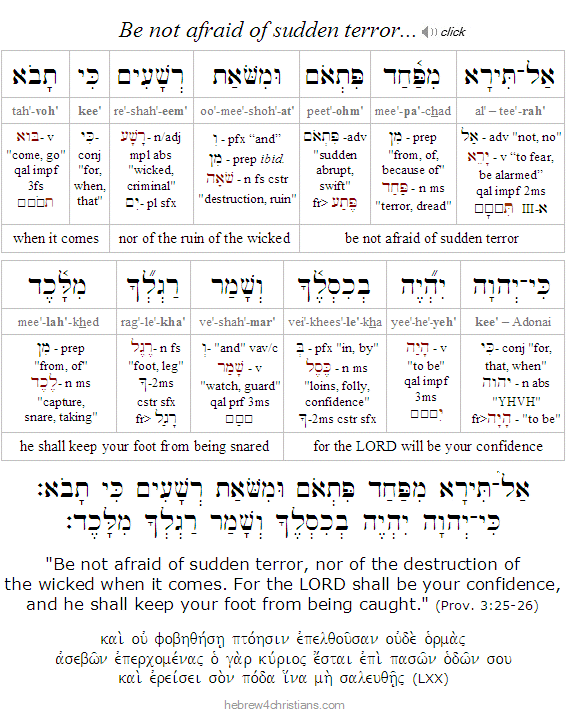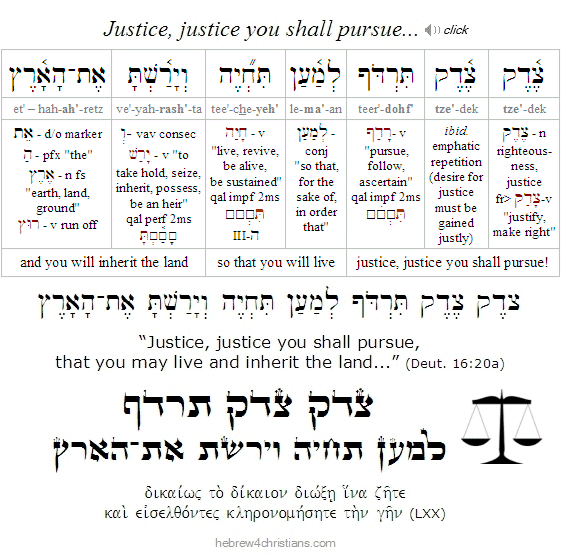|
September 2024 Updates (continued)
Note: If any page content appears to be missing, please refresh the page...
Teshuvah and the Gospel...
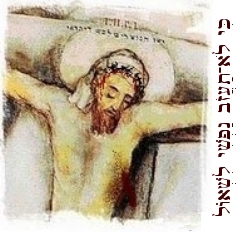
[ "Return us, our Father, to Your Torah; draw us near our King to serve You. Restore us to Your presence in complete repentance. Blessed are You, O Lord, Who desires repentance." - Amidah ]
09.06.24 (Elul 3, 5784) Yeshua began his public ministry with these words: "Repent for the kingdom of God is at hand" (שׁוּבוּ כִּי מַלְכוּת הַשָׁמַיִם קָרְבָה), which indicates that the beginning of the "gospel" message is that of teshuvah (תְּשׁוּבָה), that is, responding to the invitation of God to believe in eternal life and healing (Psalm 90:3). The message is "good news" (i.e., εὐαγγέλιον) because it proclaims that the prophesied way of redemption is fulfilled in Him, the promised "Seed of Abraham," and the "Son of Man," who had come to release us from our captivity to demonic evil by becoming our atoning sacrifice upon the cross... Yeshua's vicarious sacrifice for us removes our guilt and delivers us from the law's verdict that the guilty sinner must die. As the prophets foretold, the new way to return to God - the "new covenant" - is found in Yeshua.
According to Jewish tradition the month of Elul represents the time that Moses spent on Sinai preparing the second set of tablets after the idolatrous incident of the Golden Calf. Moses ascended on Rosh Chodesh Elul ("Head of the Month of Elul") and then descended 40 days later on the 10th of Tishri, the end of Yom Kippur, when the repentance of the people was complete. The month of Elul therefore represents the time of national sin and forgiveness obtained by means of teshuvah before the LORD.
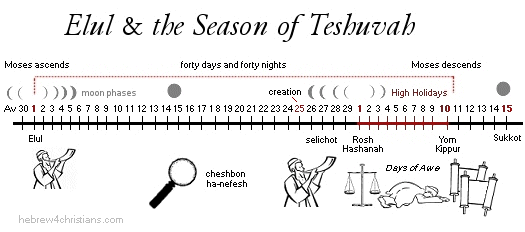 |
The month of Elul is therefore set apart for us to respond to the message of teshuvah, to take account of the soul (i.e., cheshbon ha'nefesh: חשבון הנפש), and to prepare for the fall holidays. The Alter Rebbe likened the month of Elul as a time of favor to approach our King. He used a parable to depict the season: "Before a king enters his city, its inhabitants go out to greet him and receive him in the field. At that time, anyone who so desires is granted permission to approach the king and to greet him. He receives them all pleasantly, and shows a smiling countenance to all."
"The King is in the field." He draws near to us and the hour approaches for him to be revealed. As we look for our blessed hope to be fulfilled, the sound of the great "teruah" shout ascends with the cry of the heart to be with the Lord our King. May that day come soon, and in our generation. Amen.
Teshuvah and God's Love...
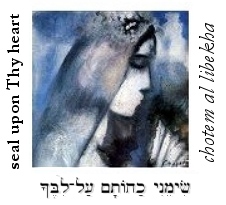
[ "The Holy One, blessed be God, said to Israel: 'My children, present to me a single opening of repentance, small like the eye of a needle, and I will open for you entrances through which wagons and carriages can pass.'" –Shir Hashirim Rabbah 5:3. ]
09.05.24 (Elul 2, 5784) If you ever feel frustrated because of recurring personal struggles and failures, do not add to your troubles by despising yourself, but instead allow your character defects to lead you to humility and surrender before God. Bear in mind that you are unable to please God apart from his intervention and help (John 6:63), so avoid self-reproach, since teshuvah (i.e., repentance) is not about learning to deal with your pains, after all, but trusting the Lord to do the miracle of healing within you.
You "have been crucified with the Messiah" (Gal. 2:20) - the verb used in this phrase is a "perfect passive" form in the original language (i.e., συνεσταύρωμα), meaning that it indicates completed action done on your behalf. Your job is not to devise your own sanctification but to receive the blessing by faith, trusting in God's righteousness given on your behalf. The focus is not on you, and when you get out of the way and surrender, the grace and love of God will do the impossible within you (Matt. 19:26).
In a way, teshuvah is a kind of death, that is, identifying with the judgment of Messiah given on your behalf, just as teshuvah is life as you take hold of your new identity in him. Practically speaking you turn away (i.e., "die to") your anger, disappointments, bitterness, and sorrows by turning to the Lord for his acceptance and grace. God will bring freedom and newness of life from what binds your heart. As C.S. Lewis once advised: "Remember that He is the artist and you are only the picture. You can't see it. So quietly submit to being painted, that is, keep fulfilling all the obvious duties of your station... asking forgiveness for each failure and then leaving it alone. You are in the right way. Walk -- don't keep on looking at it" (Collected Letters). How you do teshuvah depends a great deal on where you are standing: if you are before the cross of Messiah, then you stand on the side of divine grace; otherwise you will remain in a place of exile, questioning God's love for you. Choose to believe and you will see his heart for you...
Hebrew Lesson
Jeremiah 32:27 reading (click for audio):
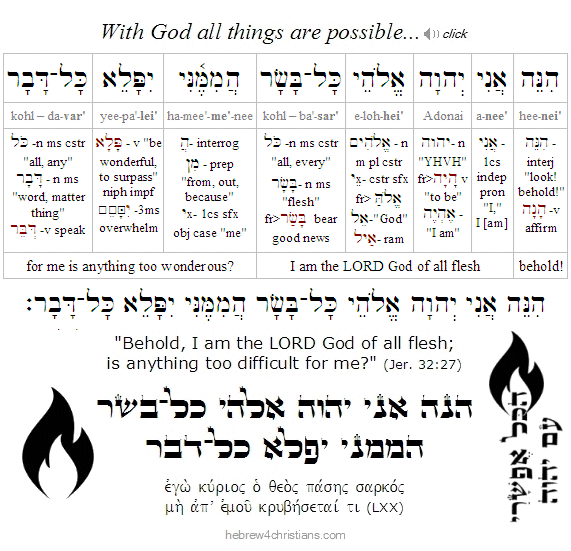 |
The "severity" of the gospel (i.e., הבשורה, from the word "basar") demands that you regard yourself as beloved, worth saving, and that you are God's friend... "There is no greater love than this: that someone lay down his life for his friends" (John 15:13). God quite literally demands that you regard yourself as benefitted by the sacrifice of his beloved son Yeshua in your place; he demands that you understand how dear you are to his heart. God sees something of such great value in you that he was willing to suffer and die to redeem it from loss... Just as the kingdom of God is a "pearl of great price," so you are a pearl of great price to God. What grieves and angers God is the refusal to believe that you are someone of infinite importance to him... Only God can rightfully make such a demand because He knows that loving other things more than Him leads to "disordered love," darkness, and eventual madness. We were created and given the breath of life for God's love, but substituting finite things for our infinite need will never suffice to bring lasting healing to our souls... He gives us choice, but it is a severe mercy.
Those who are "in the flesh" cannot please God (Rom. 8:8). We must turn away from regarding ourselves as mere "flesh" and understand that we are essentially spiritual beings created and redeemed by God (2 Cor. 5:16). We must give up the distinctions in the "world of basar" - the carnal world that is known through sensuous apprehension - and accept ourselves as "new creations" in the Messiah. It is "not the children of the flesh who are the children of God, but the children of the promise are counted as offspring" (Rom. 9:6-8).
The mere conviction of sin is not the same thing as repentance. We have to step beyond a troubled conscience and have our sin crucified by God's love and grace. Grace is therefore essential to genuine repentance, since moral reformation is never enough. "When Christ calls a man, he bids him come and die." We must be humbled so that we can receive. God gives us bitter experience of our inadequacy to call us to return to him. Only God can kill the power of sin within our hearts. Conviction of sin is not the end, but rather newness of life.
There is a place for godly sorrow, of course, and for genuine regret over our sins. As we understand God's desire and love for us, we begin to realize that the essence of sin is the refusal of God's heart for us. The underlying issue with sin concerns the question of God's love. Simply abstaining from certain actions does not address the deepest need of the heart. It is not turning away from sin that matters as much as turning toward God. The death of sin is meant to lead us to the life of love...
God is both infinitely loving and infinitely just, and both of these "attributes" are inseparably a part of who he is. God is One. Nonetheless, the cross of Yeshua proves that "love is stronger than death, passion fiercer than the grave; its flashes are flashes of fire, a raging flame, the very flame of the Lord" (Song. 8:6). It is at the cross that "love and truth have met, righteousness and peace have kissed" (Psalm 85:10). This implies that we must drop our defenses – even those supposed objections and pretenses voiced by our shame – and "accept that we are accepted." It is God's great love for you that leads you to repent and to turn to him. Allow yourself to be embraced by his "everlasting arms."
Genuine repentance will entirely change you. It is an act of profound respect over what God has done on your behalf. You say, but I am a miserable wretch! Indeed that is so, but the consciousness of your wretched state is the heart's cry for love... God goes "outside the camp" to meet with you. He enters the leper colony to join you there, in your wretchedness, and even takes upon your fatal disease. He sees you in your desperate estate and joins you there. God enters into the dust of your death and says, "Live!"
Repentance means changing your thinking, turning around to face the truth, and returning to embrace God's love. It does not identify the whole person with sin, but rather regards all people as redeemable, worthy, and valuable to God. Conviction of sin is not the end, but rather the means to newness of life. God saved us so that we could be in a love relationship with Him. We must "choose life," and that means choosing to welcome God's love into your heart. The only sin that can keep you from God's everlasting love is the denial that his love is personally for you. You must forsake seeing yourself "in the flesh" and take hold of God's spirit, his passion, and his grace for your soul. You are worthy to be loved because God is worthy to make you so.
Repent and believe the good news. God is love, and that love is for you. Amen, and may the Holy Spirit seal these words upon our heart.
Finding God at the Center...

09.05.24 (Elul 2, 5784) The Scriptures warn us that a "double-minded person is unstable in all his ways" (James 1:8). The word translated "double-minded" is dipsuchos (δίψυχος), a word formed from δίς, "twice" and ψυχή, "soul." The word describes the spiritual condition of having "two souls" that both want different things at once. It is therefore a state of inner contradiction, of having two separate minds holding contradictory thoughts. "How long will you go limping between two opinions?" Notice that the word translated "limping" is posechim (פּסְחִים), from the same root as Passover (i.e., pasach: פָּסַח): How long will you pass from one thing to another? How long will you play "hot potato" with your commitments?
Having a double-mind makes us "unstable in all our ways." Such a cross-eyed approach leads to disorientation and confusion. The Greek word used to describe being "unstable" (ἀκατάστατος) is the same word used to translate being "storm-tossed and not comforted" in last week's Haftarah portion (LXX: Isa. 54:11). The image of a ship being tossed in the sea pictures a state of distress and peril. Interestingly, the description of being "not comforted" is lo nuchamah (לא נֻחָמָה), which comes from the very word translated as "repent" or "regret" (nacham). When we are double-minded, we are "storm tossed" and unable to experience the comfort that comes from genuine repentance. We are like "a wave of the sea that is driven and tossed by the wind" (James 1:6).
On the other hand, singleness of vision concentrates the will and produces wholeheartedness, conviction, stability, inner peace (shalom) and genuine character. As Kierkegaard said, "purity of the heart is to will one thing." "I have set the LORD always before me; because He is at my right hand, I shall not be shaken" (Psalm 16:8).
Someone might ask, how do we stop being "double-minded"? This is the essence of the problem, isn't it? How do we stop being of "two minds," experiencing that ambivalence of both wanting and not wanting something? In other words, how do we repent - both in the sense of "changing our minds" (metanoia) and in the sense of practically turning to God (teshuvah)? How do we find that purity of heart that wills one thing?
The antidote for having a "double-mind" is explicitly given in the Scriptures: "Draw near to God and He will draw near to you (ἐγγίσατε τῷ θεῷ καὶ ἐγγιεῖ ὑμῖν), cleanse your hands, you sinners, and purify your hearts, you double-minded" (James 4:8). Note that the verb used in this verse ("draw near!") means to come close enough to touch someone or something. Understood in this light, we are encouraged to come so close to God that we are able to "touch" Him -- and to be touched by Him as well. Drawing near to God is God's way of drawing near to you... In other words, as you draw near to God, He will draw near and touch you.
Hebrew Lesson
Psalm 16:8 reading (click for audio):
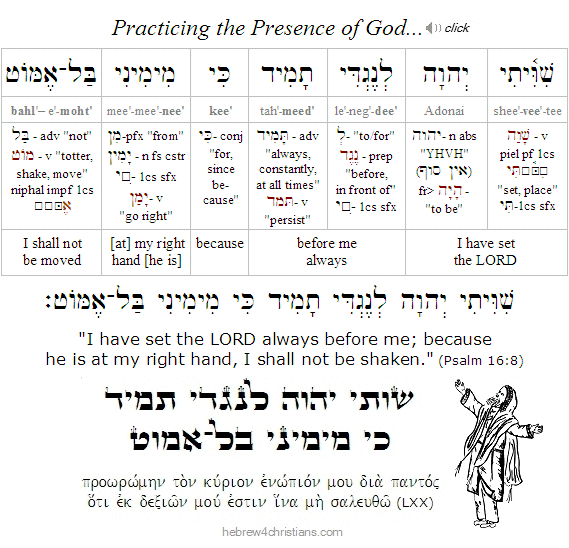 |
Regarding matters of sanctification and faith, always remember that "salvation is from the Lord," and brokenness of our spirit is God's gift to us... If you are struggling, ask God to help you surrender your "heart sickness" to Him.... It's HIS work, not your own, that saves... God alone truly changes the heart; only the Lord can make you whole. Repentance is a miracle from heaven given to you, personally...
For more on this topic see the H4C article, "Make up your Mind."
Teshuvah of Happiness...

[ "The unhappy person is one who has his ideal, the content of his life, the fullness of his consciousness, the essence of his being, in some manner outside of himself. The unhappy man is always absent from himself, never present to himself." - Soren Kierkegaard: Either/Or ]
09.05.24 (Elul 2, 5784) It is common for people to associate personal happiness with matters of circumstance. They tend to be happy whenever things are going their way, but they are unhappy if they do not. This conditional way of thinking is superstitious, however, because it regards happiness to be an "accidental" aspect of life, depending on factors or circumstances quite outside of ourselves. Many think that happiness is more a matter of dumb luck (or fate - take your pick) than of character... The heart of faith, however, affirms that all things - both the good and the bad - work for our good.
Of course, each of us is "thrown" into the world (a Heideggerian term meaning that we are radically rooted to an inscrutable chain of events beyond our control), and because of this we find ourselves born at a particular time and place, related to particular genealogical ancestors, embedded within a particular culture, and so on. Unlike Rene Descartes who questioned all his presuppositions in order to find a indubitable starting point or foundation upon which to build an edifice of objective knowledge, we acknowledge that we are overrun with presuppositions that we have unconsciously inherited from culture and that are embedded within our native language. Descartes thought he had found his starting point in the existence of his own psyche ("I think therefore I am"), but his dualism between subject and object, and between mind and matter, engendered both an impossibly high standard for attaining certainty about what we can know as well as skepticism regarding what is real.
As we reflect upon the fact that have been "thrown" into a pervasive culture (or "world") wherein we unconsciously assimilated its moral values (ethos), and its prevalent language and semantic structures, we can begin to question our presuppositions and ingrained assumptions. We begin to see how we have been systematically deceived by the fallen world, and we can then begin to think for ourselves...
If we uncritically retain our culture's biases, however, we reinforce thinking that has already been defined for us as the "status quo." It is "truth" interpreted by convention. Mindlessly conforming to the crowd's thinking is to lose your own soul. For example, consider how our culture of technology is suffused with the internet and therefore the "public interpretation" of what is real. This has led to what has been called "hyperreality," that is, the inability to distinguish between what is real and what is a simulation. Fake news; fake influencers; deepfake technology; repeated soundbites and images: the lines between the real world and the digital world have been blended and blurred... Disinformation, propaganda, and outright deception are disseminated to the "public" (by powerful controlling groups) that provide prewritten scripts designed to normalize atrocities (such as unjust wars) or to indoctrinate irrational mandates (such as deceptive vaccination or monetary policies). This creates a sense of "derealization" of the world, a sense of detachment and uncertainty about what is real. Those who dare to ask questions or to think clearly are often demonized or "canceled" by the controlling culture. An unspoken "social credit" system is surreptitiously engineered and self-censorship is a coerced virtue. Tragically, those who refuse to think deeply and clearly become unfeeling and desensitized. They "gain the world and lose their souls." They become a "programmed self" that is lost, zombified, and easily manipulated. Waking up, however, is never easy to do, and indeed makes you an enemy of the state, a thought criminal, a defector of political correctness ideology, and so on. Nevertheless, deliverance comes from confessing our lost condition, acknowledging our sin, and being willing to accept responsibility for our lives. It is a rebirth into the world of spirit and truth given by Yeshua.
The sages say that the Hebrew word for "happiness," i.e., "simchah" (שִׂמחָה), contains the word machah (מָחָה), which means to "erase" or "blot out" (see Psalm 51:1), and that this suggests that we find joy and gladness when turn away from the world and its falsehoods (העולם השׁקר). The Hebrew idea of "being happy," i.e., be'simchah (בְּשִׂמחָה) also shares the letters for the word "thought," i.e., machshavah (מָחְשׁבה), suggesting that there is a connection between how we think (that is, our "thought life") and our appropriation of happiness and joy. This "turning away" from the fallen world to God is called "teshuvah" or repentance. The Greek word for repentance is "metanoia" (μετάνοια), which means to "go beyond" (μετά) our worldly understanding (νοῦς), biases, prejudices, and habits of mind to encounter "aleithea" (ἀλήθεια), a word that means going deeper to remember the truth.
How we think, how we "frame" our thoughts, is driven by emotional connotation and nuances of the heart, and these factors contextualize our words and determine their meaning. Furthermore both the words we speak and how we speak them confess our faith - whether it be the faith of despair and anger or the faith of peace and joy. If we feel bound to circumstances and interpret the meaning of our lives as dictated by the fallen world system, we will despair and attempt to lose ourselves in endless distractions. On the other hand, if we turn to God, focusing on his presence and love, we will find joy and happiness, regardless of our present circumstances. By God's grace, we will learn to accept that whatever happens - our own "thrownness" - is really a means to our ultimate healing and blessing. We must descend in order to ascend (John 12:24).
It is written in our Scriptures: "For our light affliction, which is but for a moment, is working for us a far more exceeding and eternal weight of glory, while we do not look at the things which are seen, but at the things which are not seen. For the things which are seen are temporary, but the things which are not seen are eternal. For we know that if our earthly house, this tent, is destroyed, we have a building from God, a house not made with hands, eternal in the heavens. For in this we groan, earnestly desiring to be clothed with our habitation which is from heaven" (2 Cor. 4:17-5:2).
Amen. Keep your eyes on the goal, chaverim!
Hebrew Lesson
Psalm 51:8 reading (click for audio):
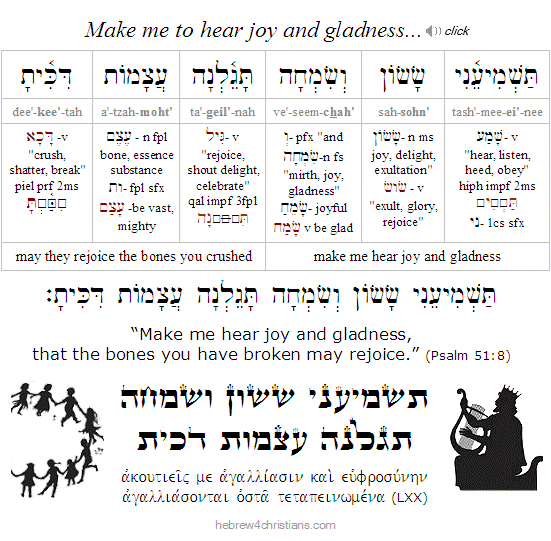 |
Being Made Whole with God...

[ "Ani l'dodi, v'dodi li; I am my beloved's and my beloved is mine." - Song of Songs 2:16 ]
09.05.24 (Elul 2, 5784) In our Torah portion for this week (i.e., Shoftim) we read: "You shall be blameless with the LORD your God" (Deut. 18:13), which seems to suggest that we should be perfectionistic in our faith, and indeed some older Bible versions translated the Hebrew word tamim (תָּמִים) as "perfect" which once meant "to be thoroughly made," though in modern times means flawless, faultless, or ideal. Because of these connotations, it is better to translate the Hebrew word as "complete," "whole," or "sincere."
When God said to Abraham, "I am El Shaddai; walk before me and be tamim (Gen. 17:1), he was not saying "be perfect" or "don't ever make a mistake," but rather be fully engaged, that is, to walk before God passionately, sincerely, wholeheartedly (מכל הלב), and by doing so to "walk out" the relationship with full assurance that he is accepted and beloved by God. Likewise when Yeshua said "Be therefore perfect as your Father who is in heaven is perfect" (Matt. 5:48), he meant that we should be complete, finished, and "made whole" by knowing and receiving the overflowing love and light of God.
"You shall be wholehearted with the LORD your God" is therefore a mandate to know who you are, to know what is truly good as distinguished from what is evil, and to be united with God's passion to be healed from your inner conflicts and ambivalence (δίψυχος). We are made "whole" or "perfect" (i.e., complete) when we resolutely turn to God for healing of what divides our hearts, as it says: "The Torah of the LORD is perfect (תָּמִים), returning the soul" (Psalm 19:8). Understand the Torah's commandment, then: "You shall be tamim (i.e., whole and wholehearted) with the LORD your God," to be a prophecy of transformation for your life, friend... Amen. And may you passionately know "the love of Messiah that surpasses knowledge and be filled with all the fullness of God" (Eph. 3:19).
Hebrew Lesson
Deut. 18:13 Hebrew reading (click):
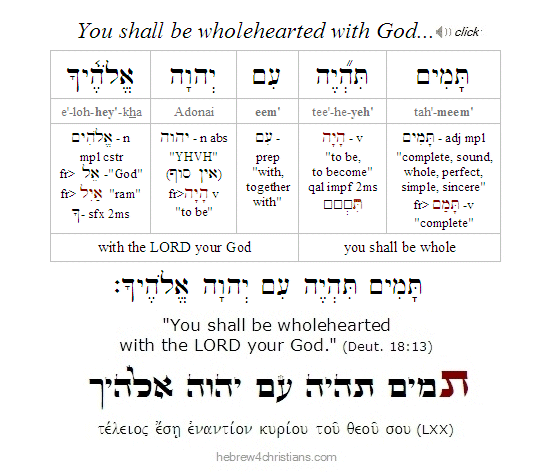 |
Note: In the Sefer Torah (i.e., the handwritten Torah scroll), the first letter of the word tamim ("wholehearted") is written extra LARGE in order to emphasize the importance of the word. Notice also the little word "with" (עִם) that follows in this verse. This hearkens to Micah 6:8: "What does the LORD require of you except to do justice (mishpat), and to love mercy (chesed), and to walk humbly (hatznea lechet) with your God?" Having a humble heart walks with the LORD. Humility begins with the awareness that 1) there is a God and 2) you are not Him.... It is the practice of da lifnei mi attah omed: "knowing before whom you stand" and living your life in light of this fundamental truth.
The Torah of Mercies...
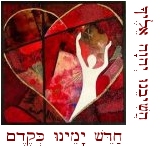
09.04.24 (Elul 1, 5784) It has been said that grace is getting what you don't deserve, whereas mercy is not getting what you do... Yeshua said, "Blessed are the merciful, for they shall receive mercy" (Matt. 5:7). This is not a reciprocal law like karma, i.e., you get in return what you first give, since we cannot obtain God's mercy as reward for our own supposed merit (Rom. 4:4). No, we are able to extend mercy to others only when we are made merciful ("full of mercy"), that is, when we first receive mercy as the gift of God (Eph. 2:8; Rom. 5:15). After all, you can't give away what you don't have, and if we have no mercy for others, it is likely that we have not received it ourselves, as the parable of the Good Samaritan reveals (Luke 10:25-8). Your forgiveness is your forgiveness, that is, as you forgive, so you reveal your heart. What you do comes from what you are, not the other way around. We are first transformed by God's grace and then come works of love. We are able to judge others mercifully, with the "good eye," because we come to believe that we are beloved by God.
When Yeshua rebuked the "holier-than-thou" attitude of some people, he said: "Go and learn what this means, 'I desire mercy, and not sacrifice.' For I came not to call the righteous, but sinners" (Matt. 9:13). The pattern therefore abides: First you realize you are broken, impoverished of heart, and you mourn over your sinful condition (Matt. 5:3-4); then you hunger and thirst for God's righteousness, that is, for his healing and deliverance, and finally you learn to trust the mercy of God, that is, you come to accept that you are accepted despite your unacceptability (Matt. 5:5-6). As you begin "suffer yourself" and forgive your own evil, you are enabled to extend this mercy to others (Matt. 5:7). In this way you begin to see God in your relationships and obey the heart of truth (Matt. 5:8; 1 Sam. 15:22).
Though we love and honor truth, we must be careful never to use it as a weapon to judge or wound others. The failure to extend mercy, to demand your "rights" or hold on to grudges, implies that you are relating to God as Judge rather than as Savior (James 2:13). If we condemn what we see in others, we have yet to truly see what is within our own hearts; we have yet to see our desperate need for God's mercy for our lives. If you don't own your own sin, your sin will own you. Being merciful is a response to God's love and therefore is essential to genuine teshuvah (repentance). Walking in love is the deepest expression of truth, since love heals untruth and embraces hope for what is presently broken (1 Cor. 13:7). In light of this, take a moment to ask the LORD to help you relinquish the pain of your past by being full of mercy toward yourself and others. Honor God's love for you by forgiving yourself and showing compassion and mercy to others in your life...
Hebrew Lesson
Hosea 6:6 Hebrew reading (click):
Deliver us from Ourselves...

[ "It is not the healthy who need a doctor, but the sick. I have not come to call the righteous, but sinners to repentance." - Yeshua ]
09.04.24 (Elul 1, 5784) We all struggle with sin in our lives, and each of us needs deliverance from various attachments and fears that keep us from the deeper life... The problem is within ourselves, that is, the contradiction of heart we experience in our double-mindedness, our ambivalence, and even our unbelief (Jer. 17:9). We may recite the Shema every day and say that we love God with all our being, but in the ordinary moments of daily life we are drawn to other concerns, alien affections, other "gods." Indeed, whatever matters most to us, whatever consumes our attention, time, resources, and our interest, is something we "worship," that is, something we esteem as worthy and valuable...
People necessarily value things, of course, and therefore every person is a "worshiper" (i.e., a person who finds "worth" in something). This is equally true for a "devout" atheist, or a "woke" crusader, as is it for a "religious" person... The question that matters, however, is what is your ultimate concern? What do you really want? Only when we begin to understand what draws and attracts us can we begin to discern what we really need. Therefore we must first acknowledge our false worship, our radical selfishness, and our sundry attachments in order to be set free. We must confess the truth that we are slaves.
Pride blinds us to the truth of our sickness, persuading us to deny our problems, to cover them up, and to try harder and harder to "control" ourselves. This is a spiritual dead-end, a vicious circle, the "law of sin and death." We are set free, however, when we die to ourselves, that is, when we surrender to the love of God and receive the miracle of promised deliverance. Since we are powerless to change ourselves, to reform our lower nature, and to be healed by our own best efforts, we must abandon our "religion" and rely entirely upon the God for the power to heal. This is an ongoing venture: We die daily; we take up the cross daily, we walk with a limp from our inner struggle, and we cling to God alone show us the way and to guide our steps. Beloved, we have been crucified with Messiah and the old nature has lost its power over us; we are alive by the miracle of God's power. May God deliver us from ourselves. "If we live by the Spirit, let us also walk in the Spirit" (Gal. 5:25).
Hebrew Lesson
Zechariah 4:6 reading (click for audio):
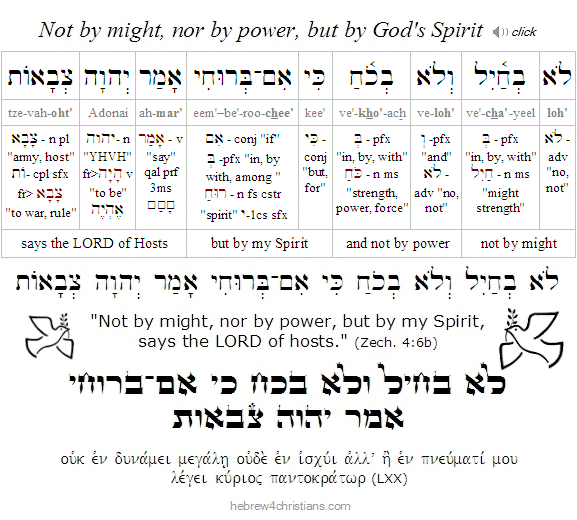 |
Spelling out "Teshuvah"...

[ Today marks Rosh Chodesh Elul and the start of the 40 days of Teshuvah... Chodesh tov! ]
09.03.24 (Av 30, 5784) Taken as a whole, the central message and ultimate point of the Scriptures is to turn to God for life... Rabbi Sussya once said: "There are five verses in the bible that constitute the essence of the Torah. These verses begin in Hebrew with one of these letters: Tav (תּ), Shin (שׁ), Vav (ו), Bet (בּ), and Hey (ה), which form the word for repentance, namely,"teshuvah" (תְּשׁובָה). The five verses are: 1) Tamim tiheyeh (תָּמִים תִּהְיֶה): "Be wholehearted before God" (Deut. 18:13); 2) Shiviti Adonai (שִׁוִּיתִי יְהוָה): "I have set the LORD always before me" (Psalm 16:8); 3) Va'ahavta lere'akha (וְאָהַבְתָּ לְרֵעֲךָ): "Love your neighbor as yourself" (Lev. 19:18); 4) Be'khol derakekha (בְּכָל־דְּרָכֶיךָ): "In all your ways know Him" (Prov. 3:6); and 5) Higgid lekha (הִגִּיד לְךָ): "Walk humbly with your God" (Micah 6:8). In other words, "teshuvah" (repentance) is an acronym that stands for being whole, seeing God, loving others, knowing God in all your journey, and walking in humility...
Hebrew Lesson
Micah 6:8 Hebrew reading (click):
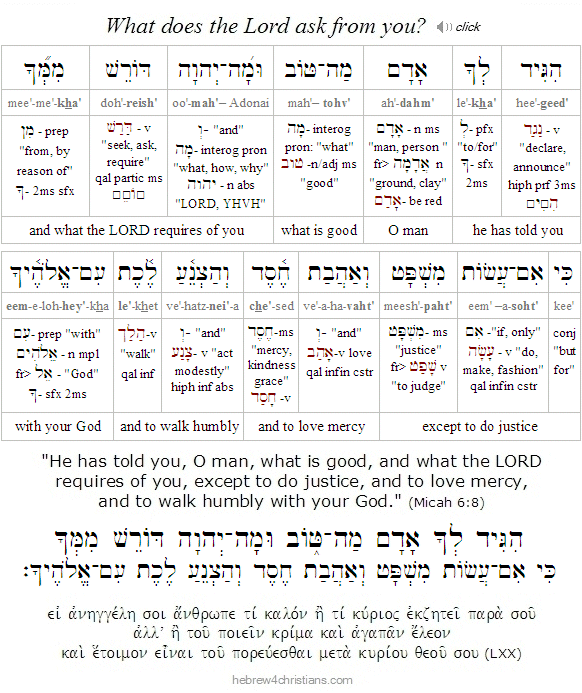 |
Courage for the End of Days...

09.03.24 (Av 30, 5784) The godless world system is an orchestrated mess. We see it in the political realm with the rise of a global "power elite" with its avowed intent to "reset" the world order and enslave humanity. We see the hidden hand at work in various ways in the world. For instance, we see the destruction of national identity (borders) and sovereignty brought about through engineered immigration (i.e., invasion) of the western nations. This creates social unrest that will destabilize populations and thereby make them easier to control. We also detect their influence in the various "wars and rumors of wars" among the nations, with ongoing propaganda campaigns and misinformation designed to confuse and mitigate any resistance. Free speech is actively suppressed and those who ask any serious questions about what is happening are persecuted and "canceled." In the economic realm, the global elite has crafted financial chaos, deconstructed the dollar, and induced unfathomable debt and fiscal irresponsibility intended to bring about a collapse of the global economy and the imposition of financial fascism. Digital currency will lead to globalist surveillance and controls that will effectively create a one-world governmental system.
We also see deliberately engineered decadence in the social realm where the systemic destruction of moral values has been indoctrinated in our public schools and universities, creating a postmodern "crusade" against traditional values and moral restraint. Propaganda and politically correct ideologies are required to be taught to employees of countless government bureaucracies and are legally enforced as "human resources" protocols for private businesses. Mass media reinforces the cultural biases in movies, music, sitcoms, and other forms of pop culture "entertainment" as well as by controlling "news" programming that promulgates and indoctrinates the disguised globalist agenda.
Perversion and godlessness are openly celebrated, "identity" politics are vaunted, opposing viewpoints are demonized and "canceled," and outright violence is justified as the means to destroy supposed "grand narratives" of historical oppression. The cultural decay is seen on our burned city streets and closed businesses. Drugs and addiction are pandemic; homelessness is widespread; mental health has become politicized to be about victim trauma intervention, and the medical establishment has been radicalized to serve big pharmaceutical financial interests. The "bad science" promoted during the time of the c§vid release was assuredly more about social control and power politics than with public health. Other things may be said about the engineered chaos of our age, but it is clear that we are living in the gloom of postmodern madness. There may be "rules for radicals" but everywhere there is a sense of anomie, anxiety, mistrust, and despair.
The Scriptures teach us, however, that it is forbidden to be afraid of the future because we are to live in the presence of God today and trust him to take care of us. "There is no fear in love," and therefore over and over the Spirit of God says, al tira' - "don't be afraid..." When we are afraid, we are believing the lie there is something beyond God's control or reach, and therefore God is "not enough"...
In times of testing you must remind yourself of what is real. God formed you in your mother's womb, breathed into you nishmat chayim, the breath of life, and numbers all your days... Every breath you take, every heartbeat in your chest is ordained from heaven, and indeed, there is not a moment of your life apart from God's sovereign and sustaining grace. So what, then, are you afraid of? Dying? Judgment in the world to come? Being left unloved, bereft of home, abandoned, consigned to outer darkness? King David said, "If I make my bed in Hell, behold, you are there" (Psalm 139:8). Look, the LORD God is not only present in your "happy moments," when you feel "put together" and respectable, but he is present in your desperate moments, in your hunger, your thirst, and in your secrets. May we never lose sight of God's love, especially in times of distress and trouble, since we trust that he is always working all things together for our ultimate good (Rom. 8:28).
The Name of the LORD (יהוה) means "Presence" and "Love" (Exod. 3:14; 34:6-7). Yeshua said, "I go to prepare a place for you," which means that his presence and love are waiting for you in whatever lies ahead (Rom. 8:35-39). To worry is "practicing the absence" of God instead of practicing His Presence... Trust the word of the Holy Spirit: "For I know the plans I have for you, declares the LORD, plans for healing peace and not for evil, to give you a future and a hope (Jer. 29:11). The Word always speaks hope.
Take comfort that your Heavenly Father sees when the sparrow falls; he arrays the flower in its hidden valley; and he calls each star by name. More importantly, the Lord sees you and knows your struggle with fear. Come to him with your needy heart and trust him to deliver you from the burdens of your soul (Matt. 11:28). Shalom means being free from fear.
This is a word for the exiles of every age: Be not afraid - al-tira' – not of man, nor of war, nor of tribulation, nor even of death itself (Rom. 8:35-39). If God be for us, who can be against us? Indeed, Yeshua came to die to destroy the power of death "and to release all those who through fear of death were subject to lifelong slavery" (Heb. 2:14-15). The resurrection of the Messiah is the focal point of history - not the "dust of death." Death does not have the final word. Indeed, because Yeshua is alive, we also shall live (John 14:19). May your chesed, O LORD, be upon us, as we wait for You (Psalm 33:22).
Nachman of Breslov once is reported to have said that "The whole earth is a very narrow bridge (כָּל־הָעוֹלָם כֻּלּוֹ גֶּשֶׁר צַר מְאד), and the point of life is never to be afraid." Likewise we understand Yeshua to be the Bridge to the Father, the narrow way of passage that leads to life. He calls out to us in the storm of this world, "Take heart. It is I; be not afraid" (Matt. 14:27). When Peter answered the call and attempted to walk across the stormy waters, he lost courage and began to sink, but Yeshua immediately reached out his hand and took hold of him, saying, "O you of little faith, why did you doubt (lit., think twice)?"
We must be careful not to let the light in us become darkness (Luke 11:35). The love and acceptance of God is the answer to our fear, not the thought of being judged by Him or attempting to merit his favor through religion. God's love is our hope, and this hope gives us courage to persevere the storms of the day... As it is written: "Be not afraid of sudden terror, nor of the destruction of the wicked when it comes. For the LORD shall be your confidence, and he shall keep your foot from being caught" (Prov. 3:25-26). Amen, may your chesed, O LORD, be upon us, as we wait for You....
Hebrew Lesson
Proverbs 3:25-26 reading (click):
Teshuvah and Truth...
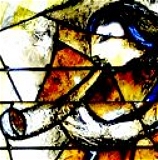
[ People perish because "they refuse to love the truth and so be saved" (2 Thess. 2:10-12). Therefore the issue of truth - physical, moral, aesthetic, spiritual, etc. - is central to salvation. ]
09.03.23 (Av 30, 5785) In the New Testament, the Greek word "metanoia" is the most commonly used word to express the idea of "repentance." The word is formed from the prefix 'μετα' ("after, beyond") combined 'νοεω' ("to think") and it generally means "changing your mind" (in the noun form) or "thinking differently" (in the verb form). Since it can also represent an "afterthought" expressed emotionally as disappointment over a loss of some kind, metanoia is similar to the idea of nacham (נָחַם) in the Hebrew Scriptures, which literally means to "sigh" heavily as a way of expressing regret or consolation. The Greek word strepho (στρέφω), like the Hebrew word shuv (שׁוּב), means to "return" to God in a practical sense, that is, by performing acts of contrition. In either case, however, Hebrew or Greek, a change of direction is implied, and that begins with changing how we think and what we regard as the truth. Repentance, then, involves a new vision, a new way of seeing reality...
Yeshua's earthly ministry began with the message, "The time has come and the kingdom of God draws near: repent (μετανοεῖτε) and believe (πιστεύετε) the good news" (Mark 1:15). These two verbs (repent and believe) are in the imperative mood. We are commanded to repent, to "change our thinking," and therefore to turn away from hopelessness - and the sin that hopelessness begets - by accepting God's intervention and deliverance. But you cannot believe if you do not first turn, and therefore you must change your focus; you must clear away the world's distractions and ready your heart to hear the message. It is then that we hear a voice crying out: "Prepare the way of the LORD and make straight in the wilderness a highway for our God!" (Isa. 40:3).
Hebrew Lesson
Isaiah 40:3 reading (click for audio):
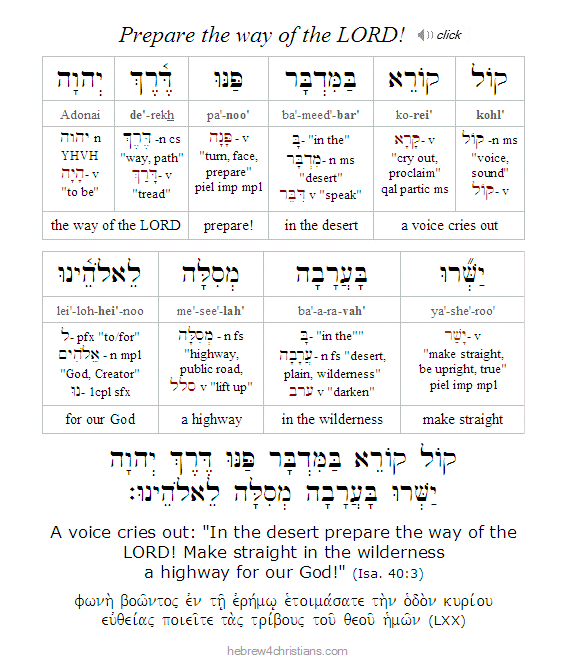 |
Note that the Hebrew word translated "prepare" in this verse (i.e., panu) comes from a root word (פָּנָה) that means to turn to face someone... The Hebrew word panim (פָּנִים), "face," comes from the same root, as does the word penimi (פְּנִימִי), "inner," and the word penimiyut (פְּנִימִיוּת), meaning "inwardness" or "immanency." This suggests that we must go within our own hearts, and there, in our "desert places," prepare for the Presence of the LORD. It is in the solitude of the desert - away from the mindless noise and empty distractions of this vain world, where we can listen and focus our heart, confess our sin, and express our great need for God... Being honest with ourselves makes us yashar (יָשַׁר), "upright," and crooked ways are made straight for God to be received... The Hebrew word mesilah (מְסִלָּה) alludes to the ladder (i.e., sullam: סֻלָּם) that Jacob saw in the desert when he received the blessing of God (Gen. 28:12). Yeshua is the Bridge, or Ladder (הַסֻּלָּם), that unites and mediates heaven and earth (John 1:51).
Since God holds us responsible to repent and believe the truth of the gospel (Acts 17:30-31), He must have made it possible for us to do so ("ought" implies "can"). And indeed, God has created us in His image so that we are able to discern spiritual truth. He created us with a logical sense (rationality) as well as a moral sense (conscience) so that we can apprehend order and find meaning in the universe He created. All our knowledge presupposes this. Whenever we experience anything through our senses, for example, we use logic to categorize and generalize from the particular to the general, and whenever we make deductions in our thinking (comparing terms, making inferences, and so on), we rely on logic. We have an innate intellectual and moral "compass" that points us to God.
Since we all necessarily must think in order to live, we should value clear thinking. This should be obvious enough, though people often make various errors and misjudgments because they devalue the effort required to carefully think through a question. As William James once said, "A great many people think they are thinking when they are merely rearranging their prejudices." When it comes to questions about the gospel, however, God regards such carelessness to be blameworthy. Again, the LORD holds us accountable for what we think and believe, especially when it comes to the reality and mission of His Son.
The truth about God is always available to human beings, if they are earnestly willing to look for it. The Divine Light that was created before the sun and the stars represents God's immanent presence that "lights up" all of creation - including our minds (Gen. 1:3). As Paul stated, "the invisible things of Him from the creation of the world are clearly seen so that people are without excuse" (Rom. 1:19-20). The heavens are constantly attesting to the reality of God's handiwork (Psalm 19:1). All of creation "shouts out" that there is a God. Even small children understand this.
Hebrew Lesson
Psalm 19:7 reading (click for audio):
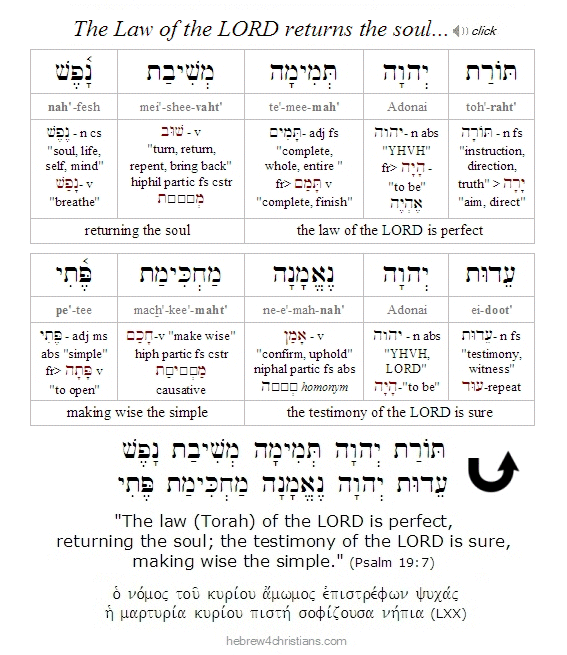 |
Note: For more on this subject, see "Teshuvah of the Mind."
Teshuvah of the Heart...
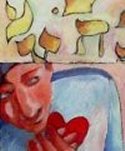
[ Rosh Chodesh Elul and the 40 days begins this evening... ]
09.02.24 (Av 29, 5784) Regarding the call to do teshuvah the LORD appeals: "Come back to me with all your heart (בְּכָל־לְבַבְכֶם) - with fasting, with weeping, and with mourning - and rend your hearts and not your garments, and return to the LORD your God (וְשׁוּבוּ אֶל־יְהוָה אֱלהֵיכֶם), for he is gracious and merciful, slow to anger, and abounding in love..." (Joel 2:13). Genuine teshuvah (repentance) is not about the "outer layers" of life, but engages the deepest depths of heart; it is not expressed in religious practices or rituals but in personal brokenness and utter desperation... As King David said, "the sacrifices of God are a broken spirit (רוּחַ נִשְׁבָּרָה); a broken and contrite heart (לֵב־נִשְׁבָּר וְנִדְכֶּה), O God, you will not despise" (Psalm 51:17). As is written in our Haftarah portion for Shabbat Shuvah: "Return O Israel (שׁוּבָה יִשְׂרָאֵל), to the LORD your God, for you have stumbled because of your iniquity; take with you words and return to the LORD (וְשׁוּבוּ אֶל־יְהוָה) and say to him, 'Take away all iniquity; accept what is good, and we will pay with bulls the vows of our lips'" (Hos. 14:1-2).
Note that the appeal to the LORD as "gracious and merciful, slow to anger, and abounding in steadfast love" (חַנּוּן וְרַחוּם הוּא אֶרֶךְ אַפַּיִם וְרַב־חֶסֶד) recalls the meaning of YHVH (יהוה) revealed to Moses in his state of brokenness over the sin of the Golden Calf (Exod. 34:6-7). It's a word for our hour of need as well.
Hebrew Lesson
Joel 2:13b Hebrew reading (click):
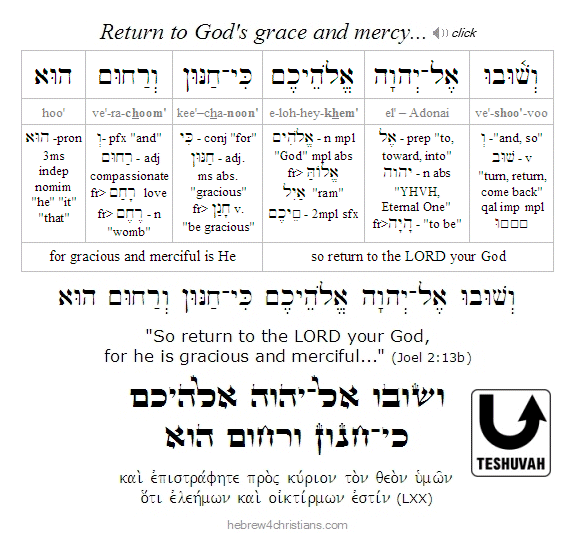 |
Daily Dvar Podcast:
Guarding your Heart...
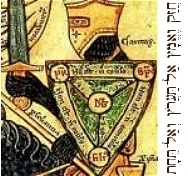
09.02.24 (Av 29, 5784) Shalom chaverim. It is written in our Scriptures: "Above all else guard your heart, for from it flow the springs of life" (Prov. 4:23). The Hebrew text for this verse is emphatic. We are to guard our hearts vigilantly, just as a prison guard or warden might keep watch over a prisoner. The phrase translated "above all else" (mikkol mishmar), literally means "more than anything that might be guarded" a construction used to intensify the command to exercise vigilance. Plainly put, this verse commands us to watch over our heart more than anything else.
In the following daily d'var broadcast (see links below), I briefly discuss the importance of guarding our hearts especially in light of the call to do teshuvah during the Forty Days leading up to Yom Kippur. I hope you find it helpful.
Linked Podcasts:
Guarding your Heart...

09.02.24 (Av 29, 5784) Our Torah portion for this week, parashat Shoftim, begins: "Judges and officers you shall give to yourself (תִּתֶּן־לְךָ) in all your gates" (Deut. 16:18). In this connection some of the sages interpreted the word "gates" (שׁערים) to refer to our sense organs, for example, the "eye gate," the "ear gate," and so on. Likewise the Lord instructs us to write the words of Torah "upon the doors of our house and on our gates" (Deut. 6:9). Because we are naturally inclined to "spy after our hearts and eyes" (Num. 15:39), we are instructed to appoint "gatekeepers" to protect the sanctity of our heart and soul, as it says: "Above all else guard your heart, for from it flow the springs of life" (Prov. 4:23).
The Hebrew text for this verse is emphatic. We are to guard our hearts vigilantly, just as a prison guard or warden might keep watch over a prisoner. The phrase translated "above all else" literally means "more than anything that might be guarded" (mikkol mishmar), a construction used to intensify the command to exercise vigilance. Plainly put, this verse commands us to watch over our heart more than anything else.
And yet "the whole head is sick, and the whole heart faint" (Isa. 1:5). We understand how apt we are to go astray in our affections, and therefore the heart is easily divided, obstructed, and liable to failure... Despite its frailty, however, the heart determines totze'ot chayim, or the "springs" or "contours" of life. In the Tanakh, the word totza'ot is often used to refer to the borders of territories or the boundaries of a city. This verse is saying that from the heart of a person (lev) a "map" or "chart" to life is drawn. As the heart is either pure or corrupt, so will be the course of one's life... Purity of heart represents healing, which means being single-minded in our affections and attention before the LORD.
How you choose to guard your heart from inner corruption and hardness will determine the "road" of your life. Concerning this verse the Metzudos commentary says, "Above all – more than anything else – a person must be careful to guard his heart from improper thoughts, for one cannot contemplate using the heart – the very vortex of life – to harbor thoughts that are inimical to life." Because the flesh is weak, we must be vigilant lest we become cynical, weary, and unfeelingly selfish. An unguarded heart soon becomes troubled, lonely, suspicious, and unstable. If, however, we keep ourselves from the obstruction of sin, we will experience the free flow of compassion, encouragement, and joy. The faithful heart is open - it believes all things, hopes all things, and endures all things (1 Cor. 13:7).
"Judges and officers you shall give to yourself (תִּתֶּן־לְךָ) in all your gates." Note that that Torah states that you shall appoint these to yourself, stated in the singular, not in the plural, to suggest that it is your personal responsibility to guard your heart from negative influences. God considers it your duty to yield yourself as a vessel or "steward" of the kingdom of God (Rom. 6:13). We must regularly ask God to enlighten "the eyes of our heart" (τοὺς ὀφθαλμοὺς τῆς καρδίας ὑμῶν) according to His wisdom and power (i.e., truth revealed in Scripture), and to impart the power of the Holy Spirit to transform our desires and affections so that they conform to the character of the Messiah (Eph. 1:18).
Hebrew Lesson
Proverbs 4:23 Hebrew reading (click):
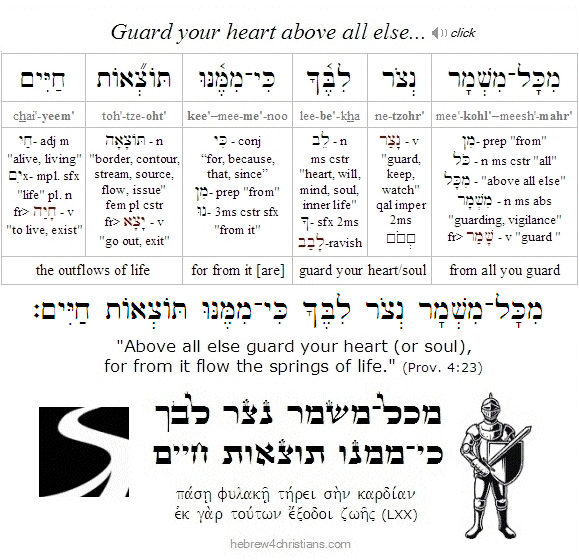 |
Parashat Shoftim - שופטים
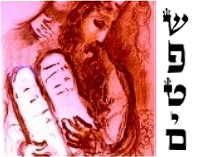
[ Surely our nihilistic and moribund culture of anarchy, relativistic chaos, and "radical" politics needs to hear the Torah regarding boundaries and matters of social justice (Jer. 18:15-16)... ]
09.01.24 (Av 28, 5784) Shalom and Shavuah tov, chaverim! Our Torah reading for this week (Shoftim) begins with the commandment that the people of Israel should appoint judges (i.e., shoftim: שׁפְטִים) and officers (i.e., shoterim: שׁוֹטְרִים) so that justice would be respected throughout the promised land (Deut. 16:18). The duty to establish justice is famously stated as, "tzedek, tzedek tirdof" (צֶדֶק צֶדֶק תִּרְדּף): "Justice, Justice you shall pursue" (Deut. 16:20). The word tzedek means "righteousness" and involves the obligation to adhere to moral truth.
Throughout the portion the theme of social justice predominates, as the ethical characteristics for judges are defined, as well as for elders, kings, prophets, and priests, all of whom are responsible for maintaining a just and healthful society. As the prophet wrote: "The work of righteousness shall be peace" (וְהָיָה מַעֲשֵׂה הַצְּדָקָה שָׁלוֹם), and "the service of righteousness (וַעֲבדַת הַצְּדָקָה) shall be quietness and security forever" (Isa. 32:17).
Hebrew Lesson
Opening words of the Torah portion (click):
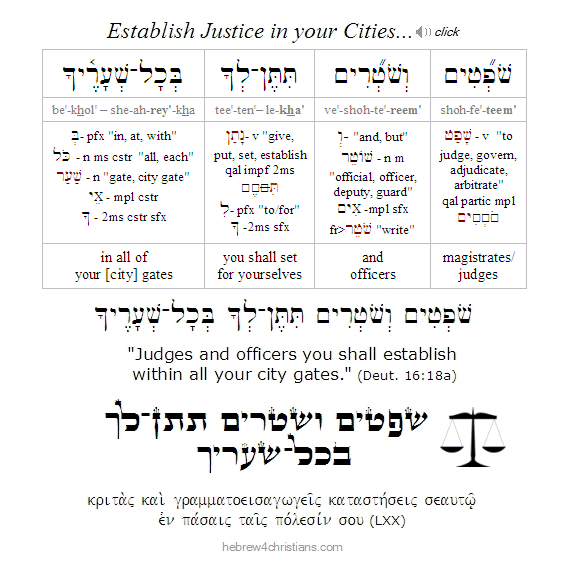 |
Note that the call for justice, "tzedek, tzedek tirdof" (צֶדֶק צֶדֶק תִּרְדּף) is stated twice to teach that justice must be pursued in an entirely just manner, that is, the methods used to obtain justice must themselves be just... Corrupt law enforcement and judicial systems, political persecution, etc., are all condemned. The Scriptures therefore do not advocate pragmatism or utilitarian thinking. There are no "noble lies" in the Kingdom of Heaven. Violence (verbal or physical) or deception done in the name of God is always forbidden and will be judged by the LORD. We must execute great restraint and caution when we seek to confront oppression in the world. If you want to change the world around you, begin with yourself....
Hebrew Lesson
Deut. 16:20 Hebrew reading (click):
<< Return
|
|
















